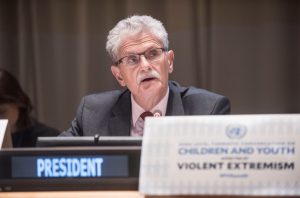Opening remarks by H.E. Mr. Mogens Lykketoft, President of the 70th session of the General Assembly at High Level Thematic Conversation on Children and Youth Affected by Violent Extremism
3 June 2016

©UN Photo
Honorable Ministers, Mr Deputy Secretary-General, Excellencies, Distinguished guests, ladies and gentlemen, good morning to you all and welcome to this High-Level Thematic Conversation on Children and Youth Affected by Violent Extremism.
At the outset, allow me to thank the Permanent Missions who have helped to organize this event including Qatar, Austria, Belgium, Indonesia, Jordan, Malaysia, Morocco, Netherlands and Saudi Arabia.
This is a subject that, in many ways, I wish we did not have to discuss.
I, like many of you, have children and grandchildren of my own.
And it is frightening to think that at a given moment, our youngest people could have their lives, hopes and futures so deeply affected by violent extremism.
It is worth remembering that many children and young people are themselves the targets and victims of violent extremist acts – we need only think of those young people lost over recent years through attacks in Norway, Nigeria, Pakistan and beyond.
Regrettably, however, millions of other children and young people are also vulnerable to radicalization and to becoming violent extremists themselves, whether in Copenhagen or Cairo, in South Carolina or Syria.
This event therefore is an important opportunity for the General Assembly to achieve a more comprehensive understanding of this subject particularly in light of the Secretary-General’s Plan of Action to Prevent Violent Extremism and as we embark on the 10 year review of the Global Counter-Terrorism Strategy.
It is an opportunity for member states and the UN system to advance their own thinking on how best to tackle these challenges;
To understand what it is that leaves children and young people so vulnerable to radicalization.
To learn from those who have been studying the push and pull factors driving young people to join violent extremist groups.
To hear from those who have first-hand experience of what it’s like to be radicalized.
To speak with those who are leading local and global efforts in this area – whether in terms of upholding the human rights of children and young people, empowering them to realize their full potential through participation in political processes, education, employment opportunities and social inclusion; or reintegrating those who have been involved in violent extremism.
We have an excellent group of speakers with us today and I encourage you all to make the most of their presence here.
There is a great deal at stake and I believe we all have a great deal to learn.
Thank you.

